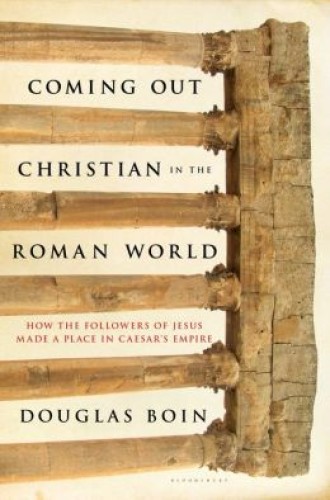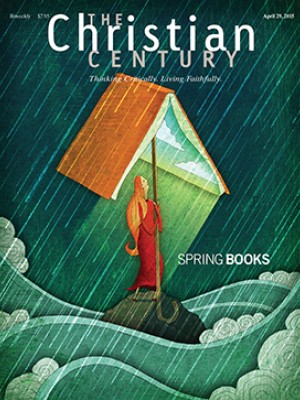Coming Out Christian in the Roman World, by Douglas Boin
The “Fall of Rome . . . is not a historical event; it’s more akin to a theological idea.” So proclaims Douglas Boin, sacking the understanding of early Christian identity that has prevailed since at least the second century.
Nineteen hundred years ago Tertullian best encapsulated the traditional story: “The more you cut us down, the more we grow. The blood of Christian martyrs is like a seed.” Living in a hostile world, Christians expected persecution, and they surely found it. Yet somehow the little movement managed to grow—despite, perhaps even because of, the persecution. Eventually Christianity came to dominate the Roman Empire, and the empire could not withstand the transition. Then came the Goths, who ushered in the unfortunately named Dark Ages. This is the story we have received, powerfully confirmed by Edward Gibbon’s The Decline and Fall of the Roman Empire and more recently by Rodney Stark’s social scientific account, The Rise of Christianity.
Tertullian did not invent the narrative. Every significant layer of the New Testament—all four Gospels, Acts, Paul’s letters, Hebrews, the Petrine epistles, and Revelation—anticipates persecution for Jesus’ followers. Polycarp’s martyrdom, the letters of Ignatius, Justin’s Apology, and the countless chronicles of martyrs attest to the same narrative arc. Before hostile crowds and bewildered authorities, persecuted but courageous Christians testified to their faith with their own tortured bodies. This storyline still shapes Christian identity in many quarters; just three days before I wrote these words, ISIS militants filmed themselves beheading 21 Coptic Christians. According to the standard account, Christianity started small, stood tall in its conflict with pagan culture, grew rapidly, and eventually quashed Roman culture with Christendom.
Read our latest issue or browse back issues.
Stark famously estimates that the Christian movement grew from a few hundred followers at the time of Jesus’ death to over 30 million by the time of Constantine—about half the population of the Roman Empire. Stark goes further: Christians’ willingness to withstand persecution contributed to the evangelism boom. Their perseverance persuaded people that Christian faith must be extremely valuable, worthy of their lives. But Boin rejects both Stark’s numbers and his explanations. As late as the year 300, Boin maintains, the empire was only 10 percent Christian. Perhaps the number of Christians had declined to 3 percent of the population by the year 400, as Ramsay MacMullen claims. Such figures directly challenge the conventional view.
Coming Out Christian turns the more familiar story on its head. A historian and archaeologist by training, Boin does not find in the ruins or in the texts evidence of a rapidly growing Christian counterculture. Why, Boin asks, do we lack distinctively Christian archaeological remains from before 300? Because Christians weren’t living particularly distinctive lives.
Boin sees just Romans. Roman culture had extended all over the Mediterranean, and most Christians lived like their neighbors. They attended games, participated in festivals, joined trade guilds, and frequented the temples just like everybody else. They came out to their Christian peers but otherwise passed as typical neighbors: “While some of Jesus’ followers were shouting about Rome as the whore of ‘Babylon,’ behaving in rather antisocial ways at Roman sacrifices, others were thoughtfully—and without any hint of drama—going on about their daily lives.” Even Constantine adopted traditional imperial imagery, styling himself after the likenesses of Jupiter, Apollo, and Hercules. Well into the fourth century bishops still felt compelled to admonish their flocks against “acting like a Greek.”
If early Christians blended in more than they stood out, so did Jews and devotees of Isis. Judaism produced conflict-oriented apocalypses and great martyr narratives like 2 and 4 Maccabees, but most Jews simply led “hyphenated lives.” Also like Christians, Isis worshipers found themselves “battling stereotypes and triumphing over random acts of discrimination.” Over time the Isis cult attained more mainstream status. Noting that Pompeii’s Isis temple included a statue of Venus, Boin suggests that Isis worshipers, like Christians and Jews, learned to accommodate their distinctive identity to their cultural context.
Boin laments that Christianity grew more militant and more intolerant as it accrued legal and social privilege in the fourth century. He does not, so far as I can tell, explain this transformation explicitly. From the early days the militant “us against the world” storyline circulated in Christian circles: “I have chosen you out of the world, . . . therefore the world hates you” (John 15:19). Perhaps greater numbers and access to power created the opportunity for intolerance to flourish. In 357 controversy broke out when a statue of Victory was removed from the Senate chamber. In 382 the statue again disappeared, with Ambrose, bishop of Milan, exerting his influence to keep the Senate chamber clean of such idolatry. Christians’ destruction of a synagogue in Callinicum (388) and of the famous temple of Serapis in Alexandria (391 or 392) portended an escalation in violence, with an outbreak of civil war in 394. By 438 the Theodosian Code banned non-Christian religious rites.
An obscure cluster of texts, the Christian Sibylline Oracles, plays a crucial role in Boin’s reconstruction. Few seminary graduates have ever heard of them; I’d venture to say that many professional biblical scholars have not read them. The Christian Sibyllines mimicked a set of oracular books attributed to the Sibyl at Cumae. The Roman Senate consulted the original books for centuries until a Christian general destroyed them in 408. Nevertheless, Jews and Christians developed their own Sibylline literature with an apocalyptic twist. Clement of Alexandria even credited the Sibylline revelations to divine inspiration. Some of these Christian Sibyllines condemned Rome’s oppression and called for its downfall. Along with Daniel and Revelation, the oracles nourished an apocalyptic faith incapable of compromise, tolerance, or nuance. Going back at least as far as Paul, the image of “soldiers for Christ” eventually empowered church leaders to condemn closeted Christians as pagans—meaning not idolaters or barbarians but civilians who risked nothing in the great cultural conflict. But “Babylon” never fell, exactly. Around the Mediterranean, Roman life persisted despite Christian rulers and laws.
Boin is a gifted writer with the rare ability to bring ancient history before modern eyes. Neither a biblical scholar nor a specialist in early Christianity, he slips occasionally. Few would portray the Pauline churches as “uncontaminated by the diseases of the ‘pagan’ world,” as Boin suggests. It’s far from obvious that the household codes instructing wives to obey their husbands, slaves their masters, and children their parents represent a retreat from more radical Christian roots. I strongly doubt that John wrote Revelation in response to that particular sort of accommodation. Perhaps inadvertently Boin’s description of the exile gives the impression that all Jews were transported to Babylon.
More significant than these minor errors stands a problem I just can’t square: If Christians represented only a small fraction of the population throughout the fourth century, how did they come to exert the level of influence Boin attributes to them?
Perhaps Boin’s coming-out metaphor is a little too clever. It led me to expect a different kind of story, one in which Christians managed secret identities and passed as ordinary people to dodge trouble in a hostile culture. A story in which the Christian movement gathered enough momentum that believers could come out of the closet, claiming their identity in public. Boin, however, moves from a discussion of discreet individual believers to a description of the emergence of an intolerant Christendom. That narrative confused me. Then again, no person gets to define another’s coming-out narrative.
We’ve come to a fork in the road regarding how we imagine the rise of Christianity. Many early Christian texts reinforce the little-movement-that-could narrative, but this model is faltering. Boin and others confront us with counterevidence—and with the stark lack of external validation for the traditional storyline. Boin wonders whether a conflictual model of Christian identity can withstand historical scrutiny, and he does not stop there. Can a militant Christianity justify itself in this global century?






